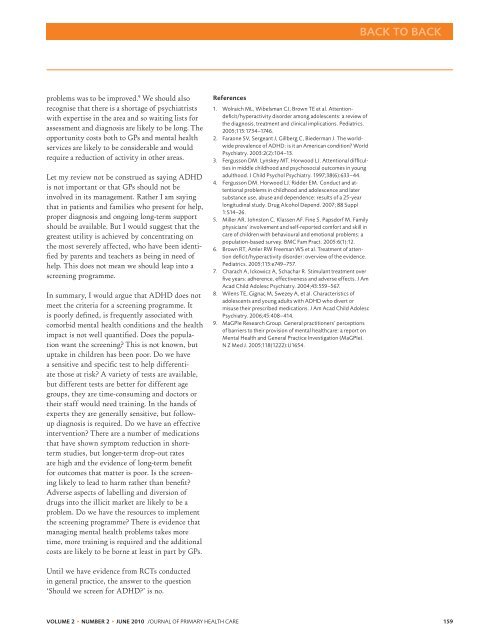entire issue - The Royal New Zealand College of General Practitioners
entire issue - The Royal New Zealand College of General Practitioners
entire issue - The Royal New Zealand College of General Practitioners
You also want an ePaper? Increase the reach of your titles
YUMPU automatically turns print PDFs into web optimized ePapers that Google loves.
BACK TO BACK<br />
problems was to be improved. 9 We should also<br />
recognise that there is a shortage <strong>of</strong> psychiatrists<br />
with expertise in the area and so waiting lists for<br />
assessment and diagnosis are likely to be long. <strong>The</strong><br />
opportunity costs both to GPs and mental health<br />
services are likely to be considerable and would<br />
require a reduction <strong>of</strong> activity in other areas.<br />
Let my review not be construed as saying ADHD<br />
is not important or that GPs should not be<br />
involved in its management. Rather I am saying<br />
that in patients and families who present for help,<br />
proper diagnosis and ongoing long-term support<br />
should be available. But I would suggest that the<br />
greatest utility is achieved by concentrating on<br />
the most severely affected, who have been identified<br />
by parents and teachers as being in need <strong>of</strong><br />
help. This does not mean we should leap into a<br />
screening programme.<br />
In summary, I would argue that ADHD does not<br />
meet the criteria for a screening programme. It<br />
is poorly defined, is frequently associated with<br />
comorbid mental health conditions and the health<br />
impact is not well quantified. Does the population<br />
want the screening? This is not known, but<br />
uptake in children has been poor. Do we have<br />
a sensitive and specific test to help differentiate<br />
those at risk? A variety <strong>of</strong> tests are available,<br />
but different tests are better for different age<br />
groups, they are time-consuming and doctors or<br />
their staff would need training. In the hands <strong>of</strong><br />
experts they are generally sensitive, but followup<br />
diagnosis is required. Do we have an effective<br />
intervention? <strong>The</strong>re are a number <strong>of</strong> medications<br />
that have shown symptom reduction in shortterm<br />
studies, but longer-term drop-out rates<br />
are high and the evidence <strong>of</strong> long-term benefit<br />
for outcomes that matter is poor. Is the screening<br />
likely to lead to harm rather than benefit?<br />
Adverse aspects <strong>of</strong> labelling and diversion <strong>of</strong><br />
drugs into the illicit market are likely to be a<br />
problem. Do we have the resources to implement<br />
the screening programme? <strong>The</strong>re is evidence that<br />
managing mental health problems takes more<br />
time, more training is required and the additional<br />
costs are likely to be borne at least in part by GPs.<br />
References<br />
1. Wolraich ML, Wibelsman CJ, Brown TE et al. Attentiondeficit/hyperactivity<br />
disorder among adolescents: a review <strong>of</strong><br />
the diagnosis, treatment and clinical implications. Pediatrics.<br />
2005;115:1734–1746.<br />
2. Faraone SV, Sergeant J, Gillberg C, Biederman J. <strong>The</strong> worldwide<br />
prevalence <strong>of</strong> ADHD: is it an American condition? World<br />
Psychiatry. 2003:2(2):104–13.<br />
3. Fergusson DM. Lynskey MT. Horwood LJ. Attentional difficulties<br />
in middle childhood and psychosocial outcomes in young<br />
adulthood. J Child Psychol Psychiatry. 1997;38(6):633–44.<br />
4. Fergusson DM. Horwood LJ. Ridder EM. Conduct and attentional<br />
problems in childhood and adolescence and later<br />
substance use, abuse and dependence: results <strong>of</strong> a 25-year<br />
longitudinal study. Drug Alcohol Depend. 2007; 88 Suppl<br />
1:S14–26.<br />
5. Miller AR. Johnston C. Klassen AF. Fine S. Papsdorf M. Family<br />
physicians’ involvement and self-reported comfort and skill in<br />
care <strong>of</strong> children with behavioural and emotional problems: a<br />
population-based survey. BMC Fam Pract. 2005:6(1):12.<br />
6. Brown RT, Amler RW Freeman WS et al. Treatment <strong>of</strong> attention<br />
deficit/hyperactivity disorder: overview <strong>of</strong> the evidence.<br />
Pediatrics. 2005;115:e749–757.<br />
7. Charach A, Ickowicz A, Schachar R. Stimulant treatment over<br />
five years: adherence, effectiveness and adverse effects. J Am<br />
Acad Child Adolesc Psychiatry. 2004;43:559–567.<br />
8. Wilens TE, Gignac M, Swezey A, et al. Characteristics <strong>of</strong><br />
adolescents and young adults with ADHD who divert or<br />
misuse their prescribed medications. J Am Acad Child Adolesc<br />
Psychiatry. 2006;45:408–414.<br />
9. MaGPIe Research Group. <strong>General</strong> practitioners’ perceptions<br />
<strong>of</strong> barriers to their provision <strong>of</strong> mental healthcare: a report on<br />
Mental Health and <strong>General</strong> Practice Investigation (MaGPIe).<br />
N Z Med J. 2005;118(1222):U1654.<br />
Until we have evidence from RCTs conducted<br />
in general practice, the answer to the question<br />
‘Should we screen for ADHD?’ is no.<br />
VOLUME 2 • NUMBER 2 • JUNE 2010 J OURNAL OF PRIMARY HEALTH CARE 159

















